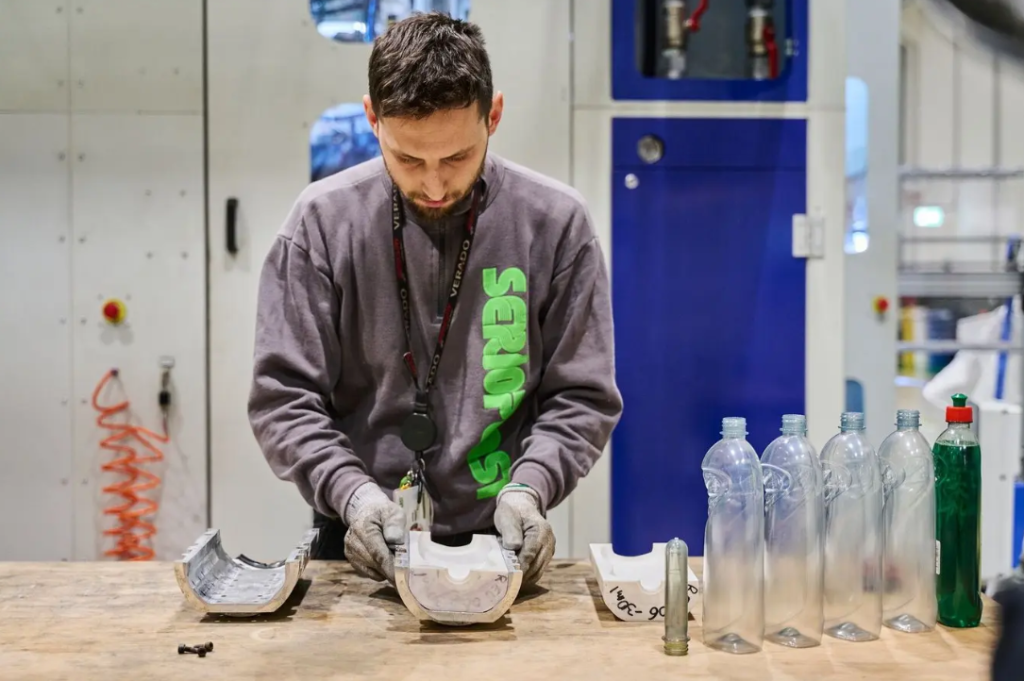Fast-Moving Consumer Goods (FMCG) provider Unilever and Serioplast Global Services are leveraging Formlabs’ 3D printing technology to overhaul the conventional process of developing and testing new bottle designs.
As per Formlabs, the journey from conceptualizing a design to mass-producing plastic bottles has been arduous and costly. The conventional method primarily involves blow molding, requiring intricate metal tooling and specialized equipment. This process is characterized by prolonged production cycles and substantial expenses, posing challenges for companies in the FMCG sector.
With room for improvement in packaging development, Unilever and Serioplast partnered to explore the feasibility of using 3D printed molds for low-volume stretch blow molding (SBM). This approach aimed to streamline prototyping and pilot testing processes, reducing lead time by six weeks and costs by up to 90%.
“A consumer goods company like Unilever must be on the market as soon as possible or before your competitors. You need to offer the best product at the best price in the shortest time possible to the consumers. 3D printing helps us speed up this process,” said, Stefano Cademartiri, CAD & Prototyping Owner, Unilever.

How 3D printing streamlined Unilever’s bottle development
Collaborating closely with Flavio Migliarelli, R&D Design Manager at Serioplast Global Services, Cademartiri aimed to conceptualize and refine new bottle designs. Together, they worked to ensure that the designs meet the company’s standards for aesthetics, functionality, and manufacturability.
According to the company, material selection is a crucial step in the process. With guidance from Formlabs engineers, the team identified Rigid 10K Resin as the optimal material for 3D printed molds. This industrial-grade material provides the ideal strength, stiffness, and thermal resistance required for the stretch blow molding (SBM) process, ensuring dimensional accuracy and stability in the final product.
Leveraging Formlabs’ Stereolithography (SLA) 3D printing technology, the team swiftly fabricated molds in a matter of days. The Form 3L SLA printer allows for the production of large-scale parts and molds, facilitating the creation of realistic pre-production samples that closely resemble the final product.
Once fabricated, the 3D printed molds, crafted with Rigid 10K Resin, are seamlessly installed onto the shell holder on the blow molding machine. This streamlined process eliminates the need for complex metal tooling, resulting in significant time and cost savings. Enabled by 3D printed molds, Unilever conducted comprehensive pilot testing. This entails meticulously validating the design, material properties, and manufacturing process.
Moreover, the 3D printed molds play a vital role in process validation. They are utilized to validate the SBM process, assess PET preforms, and test various aspects of the production line. This multifaceted approach enables Unilever to gather invaluable insights early in the development process, optimizing production efficiency and mitigating risks associated with manufacturing.
Utilizing Formlabs SLA printers and Rigid 10K Resin, Unilever and Serioplast achieved remarkable efficiency gains. Lead times were slashed by up to 70%, while tooling costs plummeted by as much as 90%. The collaboration successfully churned out pilot runs comprising 200 units within a mere two-week timeframe, says the company.
3D printing consumer goods
While there are both opportunities and challenges associated with integrating 3D printing, it offers FMCG companies a chance to personalize products and rapidly prototype designs, potentially leading to on-demand production and reduced waste. Last year, Frankfurt start-up Enable 3D partnered with German DIY magazine Selber Machen to launch the Print and Play Construction company collection.
Crafted with a recycled printing material sourced from Amsterdam-based startup Reflow, the designs were showcased in various translucent hues, all fashioned from recycled food packaging. The project’s goal was to provide environmentally conscious alternatives to conventional plastic toys, advocating for localized manufacturing and fostering parent-child collaboration.
On another note, leading US skincare brand Neutrogena introduced a line of personalized 3D printed skin health supplements at CES 2023. Dubbed ‘Skin360 SkinStacks,’ users were able to create these supplements using data collected via Neutrogena’s digital skin assessment tools.
These tools facilitated the customization of ‘nutrient stacks,’ enabling users to tailor their supplements. Following a self-scan on the Skin360 app, users were provided the opportunity to procure their personalized gummies from Nourished, a 3D printing specialist. Each of these gummies were meticulously designed with nutrient layers meticulously designed to target specific areas of skin concern.
What 3D printing trends do the industry leaders anticipate this year?
What does the Future of 3D printing hold for the next 10 years?
To stay up to date with the latest 3D printing news, don’t forget to subscribe to the 3D Printing Industry newsletter or follow us on Twitter, or like our page on Facebook.
While you’re here, why not subscribe to our Youtube channel? Featuring discussion, debriefs, video shorts, and webinar replays.
Are you looking for a job in the additive manufacturing industry? Visit 3D Printing Jobs for a selection of roles in the industry.
Featured image shows the mold 3D printed with Rigid 10K Resin is manually polished and then assembled into a metal frame. Photo via Formlabs.


